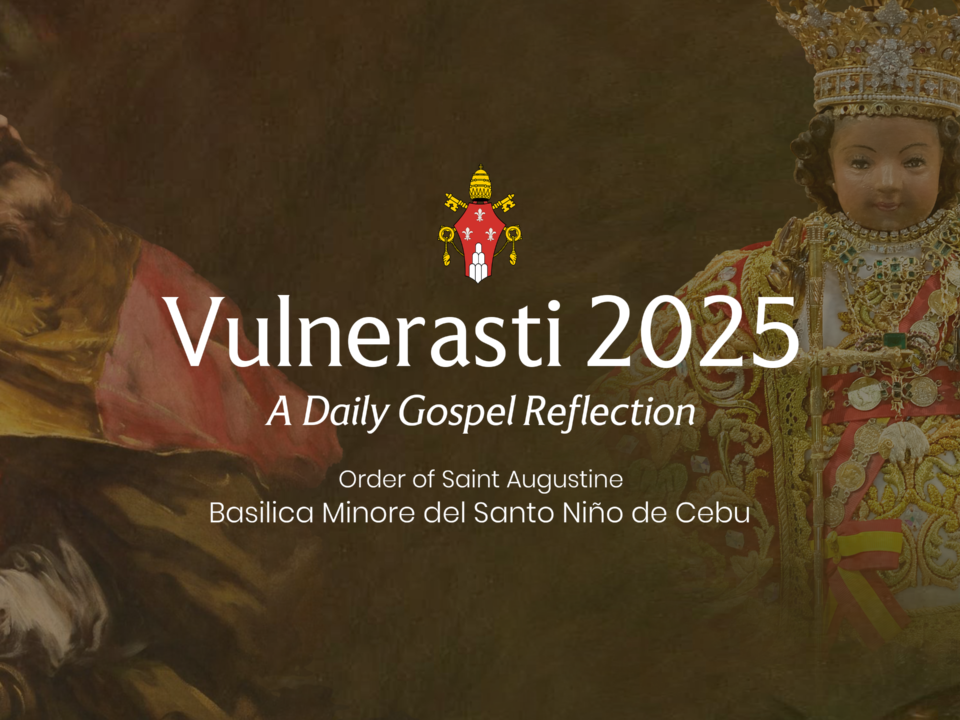Saturday of the Twenty-first Week in Ordinary Time

Today’s Reflection
Gospel: Matthew 6: 17-29
August 30, 2025 | Saturday
Today’s Gospel
Imagine someone who, before going abroad, summoned his servants to entrust his property to them. He gave five talents of silver to one servant, two talents to another servant, and one talent to a third, to each, according to his ability; and he went away. He who received five talents went at once to do business with the talents, and gained another five.
The one who received two talents did the same, and gained another two. But the one who received one talent dug a hole in the ground, and hid his master’s money.
After a long time, the master of those servants returned and asked for a reckoning. The one who had received five talents came with another five talents, saying, ‘Lord, you entrusted me with five talents, but see, I have gained five more.’ The master answered, ‘Well done, good and faithful servant, since you have been faithful in a few things, I will entrust you in charge of many things. Come and share the joy of your master.’
Then the one who had received two talents came and said, ‘Lord, you entrusted me with two talents; with them I have gained two more.’ The master said, ‘Well done, good and faithful servant, since you have been faithful in little things, I will entrust you in charge of many things. Come and share the joy of your master.’ Finally, the one who had received one talent came and said, ‘Master, I know that you are a hard man. You reap what you have not sown, and gather what you have not scattered. I was afraid, so I hid your money in the ground. Here, take what is yours!’ But his master replied, ‘Wicked and worthless servant, you know that I reap where I have not sown, and gather where I have not scattered. You should have deposited my money in the bank, and given it back to me with interest on my return.
Therefore, take the talent from him, and give it to the one who has ten. For to all those who have, more will be given, and they will have an abundance; but from those who are unproductive, even what they have will be taken from them. As for that useless servant, throw him out into outer darkness, where there will be weeping and gnashing of teeth.’
Today’s Reflection
Paul continues his exhortation and considers the people of Thessalonica as “taught by God.” All for Paul is taught by God to love their neighbors, a usual practice supposedly by any Christians. It should be inherently an action consequent to being baptized in Christ. In the short reading for today, does Paul teach that “love neighbor” is inherently a Christian characteristic? But we need to extend it to the rest of our brothers and sisters. For the people of Thessalonica, they were not to “love as taught by God” just only for among them but to extend even to the people of Macedonia and the rest of the world. This love is aroused in the soul of every believer. We hope also to have this kind of love today. The brotherly love for all men and women as soon as one becomes a child of God.
The progression of the different parables imparts to us the message of the different intentions of Jesus in “what to do and how to do?” in life in relationship with things or “possessions” entrusted to us. The parable now focuses on “service” with a heart rather than “from the heart alone.” This shift and trust given to the “servants” are actually not only the “material possession” of the master but all that belongs to him. The servant is like an “overseer” or “administrator” of all that he has. The amount entrusted to the servant was huge, even today’s equivalent. It could subsidize a small Roman Province. How long the master is absent is not known or recorded. Nonetheless, the story narrates that the slaves have to double the sum upon his return. We have the impression that slaves are good only for “manual labor” in the fields and not for administration. There were instances when slaves were educated and held administrative positions during the Roman Empire attached to their masters. This is the likely case in the parable. The parable did not narrate how they could double and in what way they have doubled the sum. It is the role of another parable to teach that lesson. Suffice it for now the way the parable presents to us. We should take note: What is disturbing about what happened to the unsuccessful third slave and the punishment given to him? We are given different talents and we need to develop them and improve the “gifts” or grace given to us to grow in our spiritual life. There is no room for being torpor. What is the message of the last part of this parable? As commonly interpreted, the Master is Christ, and we will give an account to Him afterward, during His return. He will exercise His judgment. Are those “slaves” in torpor those who have rejected Jesus? Are they also referring to those who have accepted the faith but became stale, flat, and spiritually “unproductive”?
/Vulnerasti, 2025



